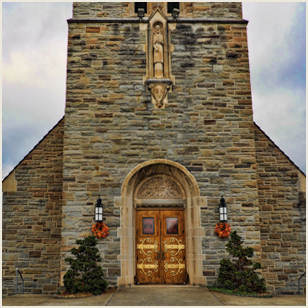Augustine (354-430), Cross, Grace, Page: Quotes, Quote Author, Quote Topic
The death of the Lord our God should not be a cause of shame for us; rather, it should be our greatest hope, our greatest glory. In taking upon himself the death that he found in us, he has most faithfully promised to give us life in him, such as we cannot have of ourselves. He loved us so much that, sinless himself, he suffered for us sinners the punishment we deserved for our sins. How then can he fail to give us the reward we deserve for our righteousness, for he is the source of righteousness? How can he, whose promises are true, fail to reward the saints when he bore the punishment of sinners, though without sin himself? Brethren, let us then fearlessly acknowledge, and even openly proclaim, that Christ was crucified for us; let us confess it, not in fear but in joy, not in shame but in glory.
–Saint Augustine (354-430)
Page: Quotes
If we want to celebrate Christmas authentically, we need to contemplate this sign: the frail simplicity of a tiny newborn child, the meekness with which he is placed in a manger, the tender affection with which he is wrapped in his swaddling clothes. That is where God is. With this sign, the Gospel reveals a paradox. It speaks of the emperor, the governor, the high and mighty of those times, yet God does not make himself present there. He appears not in the splendor of a royal palace, but in the poverty of a stable; not in pomp and show, but in simplicity of life; not in power, but in astonishing smallness. In order to meet him, we need to go where he is. We need to bow down, to humble ourselves, to make ourselves small. The newborn Child challenges us. He calls us to leave behind fleeting illusions and to turn to what is essential, to renounce our insatiable cravings, to abandon our endless yearning for things we will never have. We do well to leave such things behind, in order to discover, in the simplicity of the divine Child, peace, joy and the luminous meaning of life.
–Pope Francis (1936-
Discipleship, Page: Quotes, Quote Topic
Anyone who wishes to frolic with the devil cannot rejoice with Christ.
–Saint Peter Canisius (1521-1597) (attributed)
Page: Quotes, Quote Topic, Spiritual (life)
Happiness is not what makes us grateful. It is gratefulness that makes us happy.
–David Steindl-Rast (1926-
Page: Quotes, Quote Topic, Struggle (with Sin)
Restraint, meekness, chastity, steadfastness, patience, and similar great virtues are given us by God for weapons to resist and oppose the tribulations we meet with, and to help us when they occur. So if we train ourselves in the use of these powers and keep them always ready, then nothing that may befall us will ever be hard, grievous, destructive, or unbearable, for all would be overcome by the virtues we possess.
–Saint Anthony of Egypt (c. 251-356)
Love (others), Page: Quotes, Quote Topic, Spiritual (life)
Let us love one another, and we shall be loved by God. Let us be long-suffering toward one another, and he will be long-suffering toward our sins. Let us not render evil for evil, and he will not render to us according to our sins. We shall find remission of our transgressions in forgiving our brethren; for God”s mercy toward us is concealed in our mercifulness toward our neighbor. This is also why the Lord said: “Forgive, and ye shall be forgiven. And if ye forgive men their trespasses, your Heavenly Father will also forgive you.” After this, our salvation is already in our power.
–Saint Maximos the Confessor (580-662)

